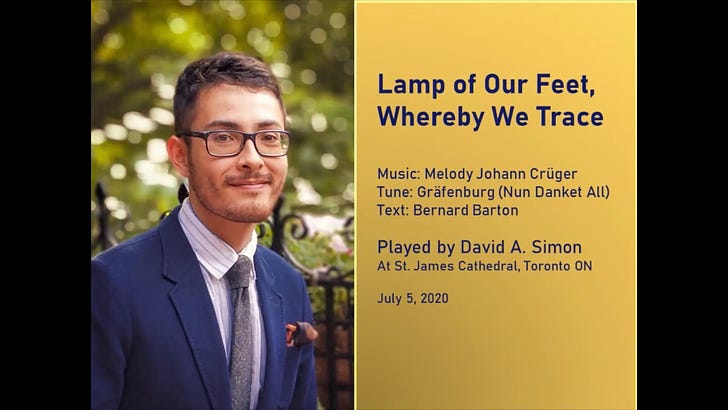When I was a small boy, I recall that there were sober and intelligent religious programs on television on a Sunday morning. The most winsome might have been Davey and Goliath, a clay-cartoon of quite high quality, wherein the boy, Davey Hansen, had to learn lessons of truth, honor, charity, forgiveness, and trust in God, all while accompanied by his faithful dog Goliath. “I don’t know, Davey,” Goliath would say, when Davey was about to do something that went over the edge of what was right. Another show, which I suppose I was too young to watch, was Lamp Unto My Feet, 451 dramas with a strong foundation in the Word of God. For as the Psalmist says, “Thy word is a lamp unto my feet, and a light to my paths.”
For the Psalmist, as for the people who produced those dramas, the word of God was not just a manual for right living. It spoke, from the person of God, to the persons he made in his image. It brightened my mind when I learned that the Hebrews called the Ten Commandments the “ten words,” and after that, when I learned to read Hebrew, I saw that the word, dabar, is verbal in force: it is a speaking. And speaking implies a person who speaks, to a person who listens. When God speaks to man, it is a great gift, one that is implied in man’s being a person at all, since all personhood is founded in God. But persons exist in action: they are not abstractions, they are not static, they do not dwell in splendid isolation. If we think of the letter of Scripture as merely abstract, and not, so to speak, as a living and sharp-edged and quickening message from God to man, we may end up like the anti-hero in Stendhal’s The Red and the Black, an atheist who knows the right theological things to say, and who says them to no good effect to himself or to anyone else.
The word of God is embodied, then, in story, in the accounts of the Lord’s saving power and his love for man, as embodied in the specifics of time and place and persons. That is what inspired the author of our Hymn of the Week, Bernard Barton, called, in England, “the Quaker poet.” Barton’s verses are clear, direct, and apparently simple, but they convey a quiet depth of feeling. Such is the case in his most celebrated poem, “The Convict’s Appeal,” spoken by a man condemned to death for a crime that is not murder: “Thou know'st how many snares were spread / Around my path with skill, / And how my heart was left unfed / With knowledge of thy will.” Well then, in “Lamp of Our Feet,” we sing praise to God for our having been fed with such knowledge. The simple poem presents us with quite a flurry of more-than-metaphors, reminiscences of the word of God from both Testaments, and of His actions in the history of salvation.
So we move from the lamp that guides our steps, to the living streams that refresh us, to the manna that fed the children of Israel in the desert, to a chart whereby we may steer our course to heaven, to the pillar of fire and the radiant cloud that shielded the Hebrews from their Egyptian pursuers, to Christ stilling the water and the winds when his terror-struck disciples were sure that they were going to drown, to the person of Christ as the glorious Son of God, and at last to the children whom Jesus called to him, saying, “Suffer the little children to come unto me, and forbid them not, for of such is the kingdom of heaven.”
That God can speak to us is implied in what it means to be a Creator: for the fullness of His power and His being is present in the smallest mustard seed of matter and the fleetest instant of time; not more almighty in the rush of the galaxies than in a single beat of a human heart. That God does speak to us is implied in his goodness and his love: but that he does not stun us into silence and impotence with his word is yet another sign of the same, since he wants sons, not slaves; Love, to be answered with love.
We had some difficulty finding a choral version of our hymn today, and so are including a very pretty organ setting, with the verses scrolling for SATB. Here is David Simon playing the organ at St. James Anglican Cathedral, Toronto.
1 Lamp of our feet, whereby we trace Our path when wont to stray; Stream from the fount of heavenly grace, Brook by the traveler's way; 2 Bread of our souls, whereon we feed, True manna from on high; Our guide and chart, wherein we read Of realms beyond the sky; 3 Pillar of fire, through watches dark, And radiant cloud by day; When waves would whelm our tossing bark, Our anchor and our stay; 4 Word of the ever-living God, Will of his glorious Son; Without thee how could earth be trod, Or heaven itself be won? 5 Lord, grant us all aright to learn The wisdom it imparts; And to its heavenly teaching turn, With simple, childlike hearts.




https://www.youtube.com/watch?v=q4ZNbOxFDfs Here's one with a woman singing it.
I have read the scriptures many times but I am always amazed when I find it speaking right into a situation or question I have been pondering. It is living and active.